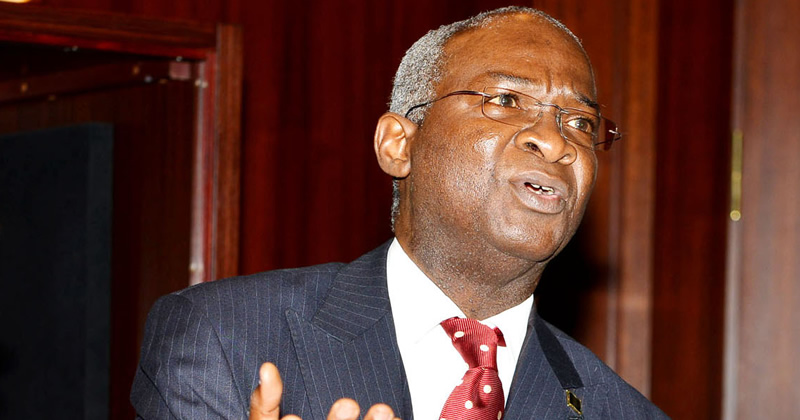The Federal Government has said it will not embark on fresh road projects until all awarded projects have been completed, even though the Works Ministry got the highest percentage of the 2020 budget.
The Minister of Works and Housing, Raji Babatunde Fashola, stated this at the weekend on a Nigerian Television Authority (NTA) programme.
The minister said the Federal Government would have to prioritise and commit its resources to completing critical roads that are nearing completion across the country instead of embarking on new ones due to “constrained fiscal environment”.
He said there were 78 of such critical roads and bridges that the government wanted to concentrate resources on and finish before contemplating new projects.
Fashola listed these as the Loko-Ogbeto Bridge, Lagos-Ibadan Expressway, Kaduna-Abuja-Zaria highway, the Suleja-Minna highway and the roads leading to the sea sorts, which he said drive the economy.
The minister said new road projects can only be embarked upon when there are compelling needs to do so.
He said: “Now, in terms of the budget size, how much is proposed? It is N261 billion; it will not be enough to discharge all our obligations. Like in any home, you want to buy books, you want to buy clothing for your children and you want to pay rent. You can never have enough money for everything. So, you have to prioritize.
“One of the things we have recommended is to first slow down, if possible, stop new projects and commit our limited resources to completing projects that are nearing completion.
“So, we have about 78 of this type of projects that we want to concentrate resources on and finish them, like some of the bridges you have shown: the Loko-Ogbeto Bridge, Lagos-Ibadan Expressway, Kaduna-Abuja-Zaria highway, the roads to the ports.
Read Also: We won’t embark on new road projects until…-FG
“Those are roads that carry heavy vehicles and those are the roads that drive the economy. They lead to the ports; roads like Suleja-Minna highway. So, those are going to be our priorities; roads to agricultural areas, like the Enugu-Port Harcourt, which connects Ebonyi, Anambra and some of those states.
“No nation ever has enough money, anyway. So, those are the priorities. But we also have outstanding payments and we have made this known to the President and his commitment to do his best within the constrained fiscal space to support the infrastructure objective not only of my ministry but transportation to aviation, are so critical because these are the things that will grow the economy.
“Let us focus on the high priorities of the economic objectives of this country. Let us use our limited resources to complete what we have started. It is completed roads that really add value to the economy, instead of adding more that we cannot complete.”
But that doesn’t mean that if there is a compelling need to start a new project we will not. Rules must first be general before we look for the exceptions to the rules.”
On government’s commitment to developing the country, Fashola said: “The Federal Government is committed to infrastructure development, in spite of the difficult financial climate.
“Oil prices have dropped from where they were pre-2015. But in spite of that, it is evident that the government’s commitment to infrastructure is unflagging and the reason is clear: without infrastructure, business will be difficult and the economy won’t grow. So, the focus of the government is appropriate.
“We have 525 projects going on simultaneously across the country. Some of them are slowed, some of them have picked up, some of them are challenged by finances and so on. But I think it is important to note that the present weather conditions are a difficult period for anybody who is involved in delivering, managing or maintaining public infrastructure, especially transport-related infrastructure all over the world.”
